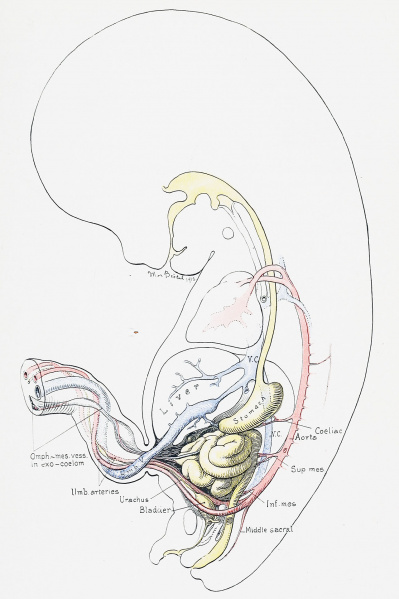File:Cullen1916 fig13.jpg

Original file (1,280 × 1,921 pixels, file size: 276 KB, MIME type: image/jpeg)
Fig. 13. Sagittal Section of the Umbilical Region in a Human Embryo 4.5 cm. in Length. The intestine has receded completely into the abdominal cavity. The exoccelomic cavity, although small in size is still clearly recognizable in the cord, where it shows spindle-shaped dilatations. It now contains only the omphalomesenteric vessels, which have become embedded in its wall. The allantois (urachus) is the distal prolongation of the urinary bladder, and shows already the characteristic dilatations noticeable in older embryos and occasionally found after birth. The structures of the cord show the characteristic twisting of the embryo to the right.
Reference
Cullen TS. Embryology, anatomy, and diseases of the umbilicus together with diseases of the urachus. (1916) W. B. Saunders Company, Philadelphia And London.
Cite this page: Hill, M.A. (2024, June 26) Embryology Cullen1916 fig13.jpg. Retrieved from https://embryology.med.unsw.edu.au/embryology/index.php/File:Cullen1916_fig13.jpg
- © Dr Mark Hill 2024, UNSW Embryology ISBN: 978 0 7334 2609 4 - UNSW CRICOS Provider Code No. 00098G
File history
Yi efo/eka'e gwa ebo wo le nyangagi wuncin ye kamina wunga tinya nan
| Gwalagizhi | Nyangagi | Dimensions | User | Comment | |
|---|---|---|---|---|---|
| current | 17:25, 27 October 2018 |  | 1,280 × 1,921 (276 KB) | Z8600021 (talk | contribs) | |
| 17:24, 27 October 2018 |  | 2,064 × 3,141 (771 KB) | Z8600021 (talk | contribs) | Fig. 13. Sagittal Section of the Umbilical Region in a Human Embryo 4.5 cm. in Length. The intestine has receded completely into the abdominal cavity. The exoccelomic cavity, although small in size is still clearly recognizable in the cord, where it... |
You cannot overwrite this file.
File usage
The following 3 pages use this file: